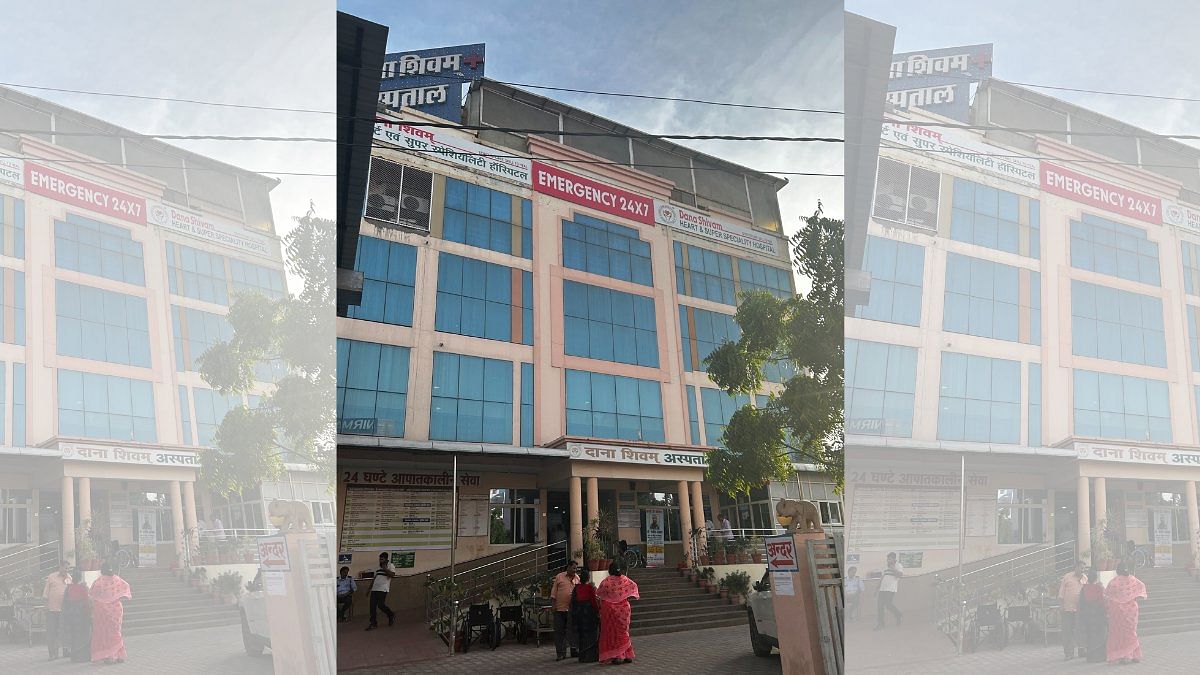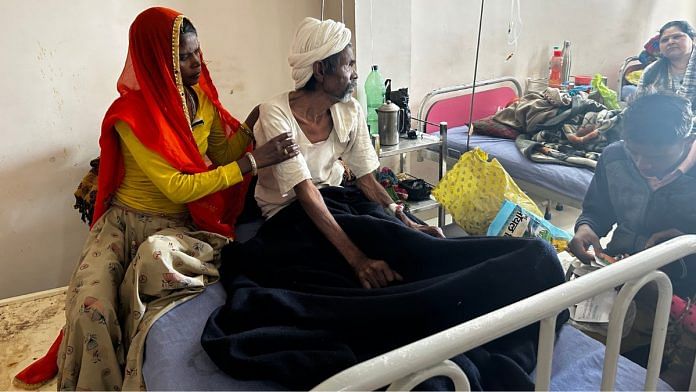Tonk/Jaipur: On 12 February, Surja, a 26-year-old daily wage labourer, rushed her father Kalu Ram to Aggrawal Hospital, a private facility in Rajasthan’s Tonk district. The 56-year-old, a tuberculosis patient, was extremely weak and struggling to breathe.
“We thought he would die,” said Surja, the eldest among three daughters of the Scheduled Caste family, told ThePrint.
Armed with the family Jan Aadhaar card, she didn’t think twice before leaving her work to tend to her father. Her family is among the 3.2 million beneficiaries of the Mukhya Mantri Chiranjeevi Swasthya Bima Yojana, a state government scheme launched in 2021 to provide health insurance to economically weaker sections.
In his budget speech last week, Chief Minister Ashok Gehlot also announced an increase in the annual cover amount to Rs 25 lakh from Rs 10 lakh per family.
But Kalu Ram was denied free critical care treatment under the scheme. Instead, Surja ended up paying over Rs 30,000 between 12 and 15 February for his treatment.
Surja’s debts are mounting with each passing day as Rajasthan’s private medical associations continue to boycott government schemes in protest against the Right to Health Bill. This has affected patients like Kalu Ram, whose families are forced to either pay beyond their means or go without treatment.
The Right to Health Bill — which seeks to establish legal rights and entitlement of citizens to avail the best of health services — was one of the poll promises of the Congress for the 2018 state elections. The Bill was tabled in assembly in September 2022 and has faced rough weather since, due to its provision for mandatory free-of-cost emergency treatment, among other reasons. It is yet to be passed in the ongoing budget session.
Speaking to ThePrint, Dr Surender Aggrawal, who owns the Tonk hospital, expressed his helplessness in not admitting anyone under the Chiranjeevi scheme in the light of state-wide protests by hospitals.
The ward in which Surja’s father is admitted had only nine patients on 15 February, the day ThePrint visited them. Earlier, the second storey of this hospital, one of the busiest in Tonk, saw a footfall of 250 patients everyday, said Dr Aggrawal. Within a week, the daily footfall of 40-50 patients at each of the hospital’s four general wards has dropped to 9-10, according to the data shared by the hospital.
ThePrint met Dr Prithvi Raj, secretary, Medical Health & Family Welfare Department, Friday, but he refused to comment on the ongoing protest as well as on the Right to Health Bill.
Also read: 2 clerks, 1 director, 1 room—AIIMS Darbhanga a story of political rush to announce & forget
Meetings, delays
Private doctors call the Right to Health Bill draconian while civil society groups have questioned the former’s protests against it. In a joint statement earlier this week, more than 100 civil society organisations expressed shock that doctors were trying to prevent a Bill which is a crucial constitutional right.
“The doctors have a right to protest but the way they are doing it by denying health services under Chiranjeevi is not correct,” said Chhaya Pachauli, state coordinator of the Jan Swasthya Abhiyan, Rajasthan, a network of civil society organisations focused on healthcare.
She added that private doctors were trying to create a perception that the Bill is being brought in to regulate the private sector, but 90 per cent of the content of the Bill is about strengthening the public healthcare system. “The private sector is essentially trying to create a narrative that this Bill is useless and unnecessary. This is very misleading,” she said.
The Opposition cannot afford to slam the Bill, aimed at providing healthcare to the poor, publicly. The government has been in talks with a 34-member Joint Action Committee (JAC) formed by various medical associations such as Indian Medical Association (IMA)-Rajasthan chapter and United Private Clinics & Hospitals Association of Rajasthan (UPCHAR), a representative body of over 1,000 private hospitals.
The last such meeting was held on 11 February where four members of the JAC met the assembly’s standing committee comprising 18 members including Rajasthan Health Minister Parsadi Lal Meena, and the deputy Leader of Opposition. The meeting, which lasted two hours, was inconclusive, leaving the doctors angrier. The next meeting is scheduled for 3 March.
“Though initially we opposed the Bill in its entirety, we ended up asking for some amendments to it. But our reservations have not been addressed,” said Dr Sunil Kumar Garssa, who runs Dana Shiva, a heart and super specialty hospital in Jaipur, and was a part of the JAC delegation at the meeting.
“Left with no option,” said Dr Garssa, they called for a statewide boycott on 11 February.

According to the details UPCHAR shared with ThePrint, 1,700 private hospitals under them were open on 12 February but the emergency service under both Chiranjeevi and Rajasthan Government Health Scheme (RGHS) continue to remain shut almost a week on.
“The Bill was drafted with ill intention. They want to create problems for private doctors who are catering to 70 per cent of the state’s medical needs,” Dr Garssa added.
‘Define emergency, give reimbursement’
The doctors claim that though the Bill promises free emergency treatment, it doesn’t define emergency. “World Health Organization (WHO) has defined emergency, but the Bill leaves (out) the word ‘trauma’ and simply refers to emergency. For a patient, even a headache is an emergency,” Dr Aggrawal from Tonk told ThePrint.
“There is nothing (in the Bill) about reimbursement or payment. We are ready to treat everyone free of cost, but who is going to reimburse the amount? How are we going to pay the staff, nurses, and doctors?” he asked.
But the biggest cause of worry is the proposed setting up of district health authority and state health authority — with public representatives as its members.
The Bar of Jurisdiction in the 14-page draft Bill, a copy of which is with ThePrint, says, “No civil court shall have jurisdiction to entertain any suit or proceeding in respect of any matter which the State Health Authority or District Health Authority, as the case may be, constituted under this Act is empowered by or under this Act to determine.”
This means that the courts won’t have any jurisdiction. As the Bill mandates that three pradhans and zilla pramukhs will also be a part of the district health authority, doctors fear they may be harassed, threatened or blackmailed by the members.
“Anyone can come to inspect us, threaten us, blackmail us by saying that he is connected to the pradhan, pramukh, or zila parishad. Are you going to unleash violence on us?” a Jhunjhunu-based doctor asked.
(Edited by Smriti Sinha)
Also read: AIIMS Jodhpur has changed healthcare in Rajasthan. But now it’s cracking under patient load



